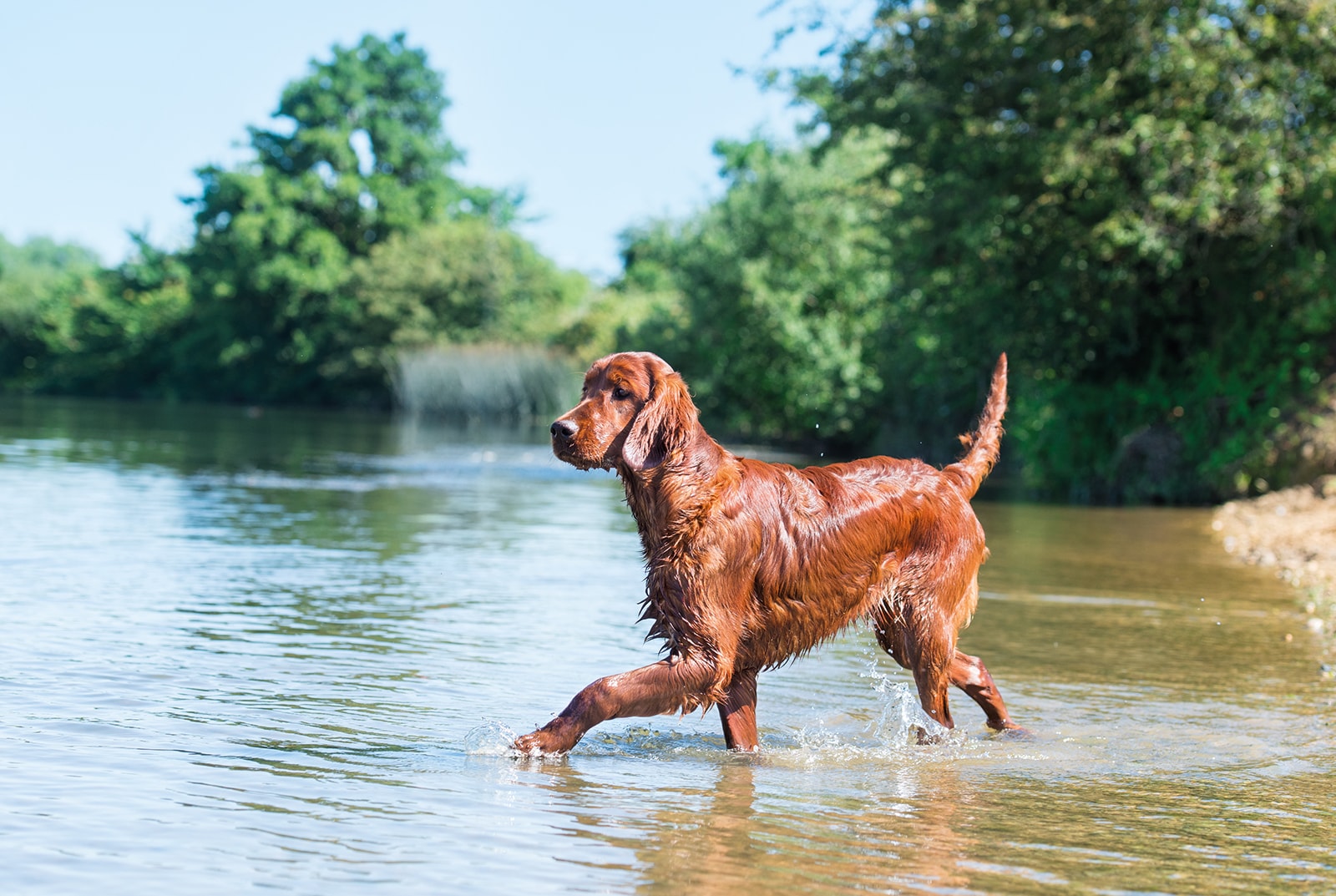Protecting your pet in different climates
The Importance of Four Seasons of Shade
Even if your dog spends a lot of time outside, it’s important to make sure they have access to a comfortable, cool room to sleep in. When they are outside, it’s a good idea to provide them with somewhere they can shelter from extreme weather conditions like heat, cold or rain.
Surviving Summer
Dogs are just as prone to overheating as us. Although your dog will naturally seek shade and water when it gets hot, sometimes they need help.
You might want to consider:
- Always provide plenty of fresh water. Make sure you pack a bottle of water for them when you go out for walks. Just as paved areas are hot to the touch of our own feet, they can also burn the paws of your dog. Consider walking them on grassy areas when it’s hot.
- Paddling pools aren’t only for children! If your dog likes water, this could provide a welcome relief from the summer heat.
- Leave them at home when you jog. Though dogs pant to stay cool, they can have a difficult time cooling off if the air is warm.
- Avoid too much time in the car. If the trip is essential, consider using air conditioning to help maintain a comfortable temperature and never leave your dog unattended in a hot car
- Adding some ice cubes to their bowl at home can be a great way to cool them.
- Want to treat them on a warm day freezing chicken stock can be a great way to keep your dog cool. Low calorie as well!
Treating Overheating
Be aware of the following symptoms of heat exhaustion:
- Abnormally rapid breathing
- Tremors
- Muscle weakness
- Vomiting
- Fainting
If you suspect your dog is suffering from heat exhaustion, it’s essential to go to the vet.
Rain
What about when it’s raining? A healthy dose of common sense and precaution should be taken, in particular if there are flood risks and thunderstorms forecast. For the most part, a walk in the rain is a given for dog owners.
If your dog gets wet while you’re out, whether from rain or swimming, it’s important to towel dry them when you get home, including their paws. This will help them to recover their body temperature quickly when it’s cold and will also help protect their skin from any irritation due to damp.
Jackets
In the darker, winter months a dog jacket with reflective strips is a good idea, helping you both stay visible.
If your dog has a thinner coat, a waterproof jacket can help protect their skin from getting sore in damp conditions.
Autumn: fleas, fog and foraging
As summer becomes autumn, be aware of flea and tick season beginning. Make sure that you’re on top of your parasite prevention routine.
If you let your dog off the lead when it’s foggy outside, it’s essential that they consistently come back to you when called.
Practice this through play in the lighter months to prevent stress.
Another seasonal risk is mushrooms, which can be toxic to dogs. Be cautious of what’s growing outdoors as dogs are prone to foraging. If you think your dog might have eaten mushrooms, take a photo or sample to your vet who can help determine if it poses a threat.
Weathering Winter
Although some breeds are hardier than others when it comes to colder climates, it’s essential that all dogs have an insulated, comfortable and protected shelter.
Whether your dog lives indoors with you or outdoors, it’s essential you check their paws for cuts, ice and grit when it’s cold. Like us, their skin can be sensitive and prolonged exposure to the cold and chemicals can cause serious tissue damage. Additionally, grit and other de-icing chemicals can cause potentially dangerous stomach upsets.
Treating Frostbite
Frostbite is caused by exposure to extremely cold weather. The symptoms, which don't always develop until 48 hours after exposure, include pain and swelling. If the blood flow is entirely interrupted to the extremity, the tissue will turn black and fall off.
If you suspect your dog has frostbite, we recommend taking them to the vet – it’s better to be safe than sorry.
Some practical home care tips for frostbite:
- Bathe your dog in warm (never hot) water. Test the water temperature by dipping your elbow into it (this is more accurate than using your hand).
- Hug them to you so that your body heat can warm them.
- Never rub them, as this could damage tissue.
- Take your pet to the vet immediately if they are severely chilled or unresponsive.
Beware of Hazards in the Garage
The dangers of winter aren’t just the temperature though. If your dog has easy access to your garage, it’s important to be careful of the following risks:
Licking up only a few teaspoons of antifreeze (which tastes sweet to your pets) can kill. As a good rule of thumb, keep chemicals out of reach, and check to be sure there are no leaks in your car's radiator.
Never leave your pet in the garage while your car is running, as carbon monoxide fumes from the exhaust can be fatal.
SIGN UP FOR MONTHLY EXPERT TIPS AND INCENTIVES
Track your dog's development with our monthly tips on nutrition and health, tailored to your dog's age and breed size.

